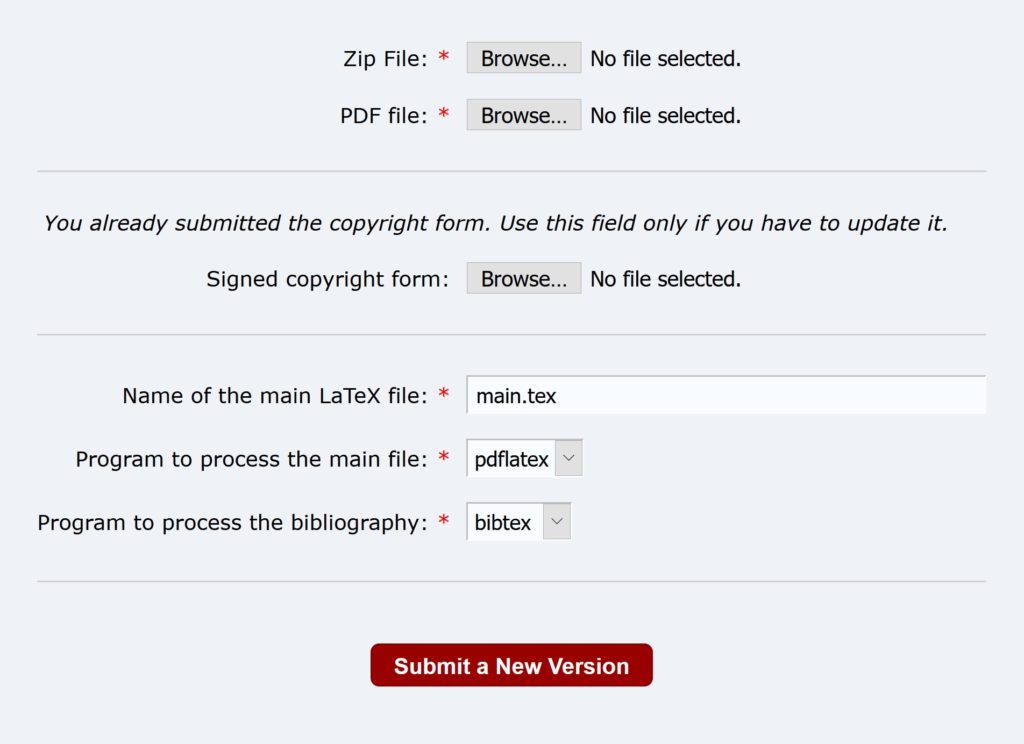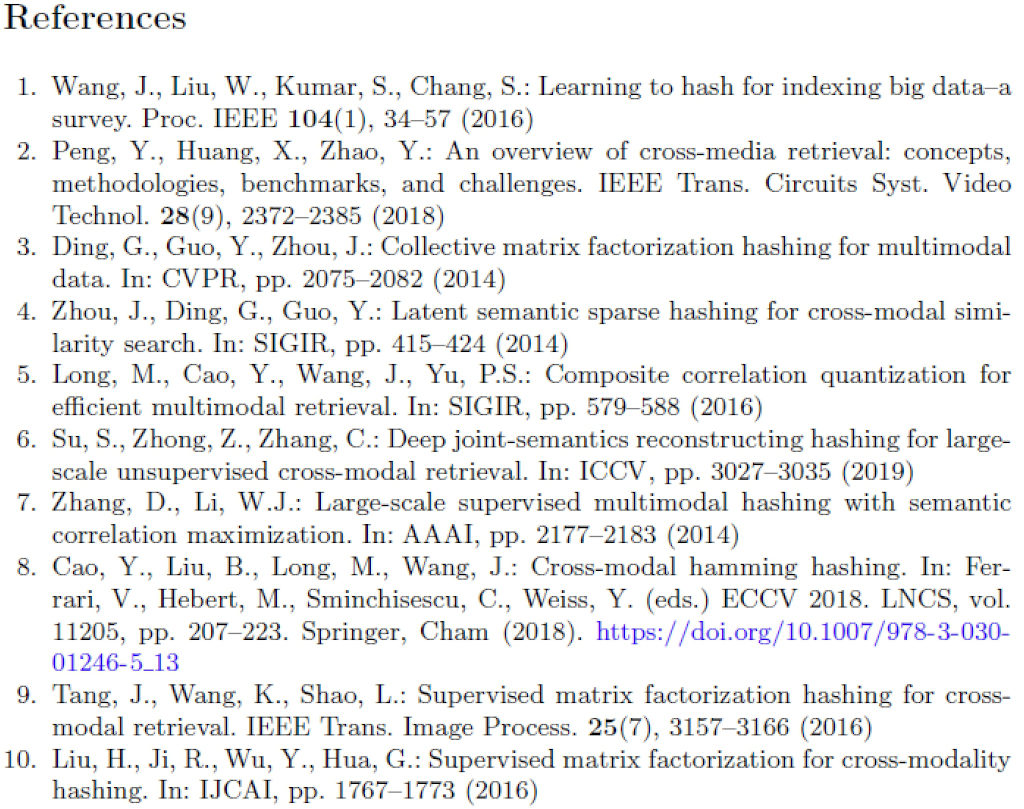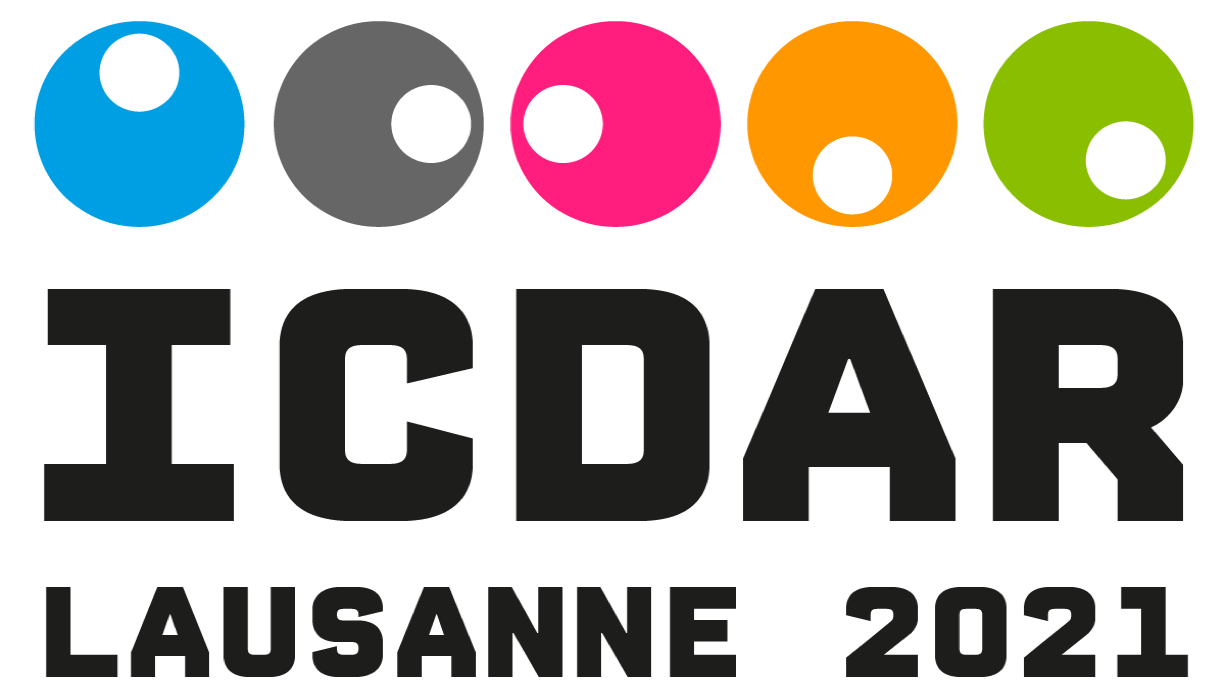
CAMERA-READY WORKSHOPS SUBMISSION
Deadline
For ICDAR 2021 workshops to be published with Springer LNCS, authors of accepted papers should submit the camera-ready version of their paper and the signed copyright form by July 5, 2021. The submission portal can be accessed on the EasyChair website after you receive the EasyChair’s invitation email. The papers will be submitted as invited papers in EasyChair. After logging in, please select the role of “proceedings author” for ICDAR 2021 workshops.
Please note that one ZIP archive file (*.zip) is required to be uploaded, which includes all the LaTeX source files (with main.tex), the PDF of authors’ camera-ready paper copy (*.pdf) and the signed copyright form (copyright.pdf). One example of such a ZIP file with blank templates can be found here. Please carefully read the instructions section below for preparing the final submission materials. The paper you submit is final. It is expected that all copyright issues have been resolved, no references have been omitted, and that the authors listed in the paper are the final authors. Revisions to your submission will not be permitted after July 5, 2021.
Each accepted paper requires at least one author to have performed a Full Registration before July 5, 2021 in order to include and publish the paper in the workshop proceedings. One full registration covers a maximum of 2 papers by the same author. Note that the presenter of the paper does not need to be the same author who made the full registration.
Publication
Recent past ICDAR proceedings have been published using IEEE Computer Society’s Conference Publishing Services (CPS). Based on successful collaborations between IAPR and Springer, the proceedings of ICDAR 2021 conference and workshops will be published in the Springer Lecture Notes in Computer Science series (Springer LNCS).
This change provides the proceedings of the conference and the workshops with an excellent online accessibility, including free access to SpringerLink via links on the conference website during one year after the conference and free access for everyone in SpringerLink four years after the conference. One year after the conference (before the free access for everyone in SpringerLink), the authors’ final submitted and accepted versions of the conference and workshop papers are available via the ICDAR 2021 conference website.
The authors’ final submitted and accepted versions of the conference and workshop papers may be archived by the authors on their own personal websites, their employers’ internal websites and institutional or funder repositories, with links to the official versions in SpringerLink, and with appropriate information for the reader: “This ICDAR 2021 paper is the final author-created version, submitted to and accepted by the conference / workshop [as appropriate]. The formal version of this paper is published in Springer’s Lecture Notes in Computer Science series, and is available from Springer’s digital library, SpringerLink, at [insert hyperlink/DOI] and via https://link.springer.com/conference/icdar.”
Authors who have included their email addresses in their papers will receive an email roughly four weeks after publication of the proceedings, linking them to their personal My Springer page. They will be able to download the pdf of the entire volume. In addition, authors and editors are entitled to a substantial discount off Springer publications. Details are given on the My Springer page.
The proceedings volumes will be submitted by Springer for indexing to Scopus, WoS (Web of Science, Clarivate Analytics), DBLP, EI Compendex, CrossRef, Google Scholar, and Google Books.
Instructions
- Please carefully take into account the reviewers’ comments and improve your paper when preparing the camera-ready version.
- The template for the camera-ready papers is the same for initial submissions. The LaTeX template for LNCS can be downloaded here. It is also available on Overleaf. However, the authors should de-anonymize the paper by adding author names, affiliations, email addresses, and ORCIDs. The authors should insert their ORCIDs in superscript next to their names (please see the LaTeX templates for examples). The authors can also add acknowledgement information if applicable.
- The number of pages is expected to be in the range of 12-15 pages. Authors are allowed to use maximum one additional extra page for preparing the camera-ready version (for a maximum of 16 total pages), if and only if the de-anonymization and the integration of the reviewer comments require it. This extra page is free of charge. Paid additional pages are not supported.
- To upload your camera-ready paper and copyright form, please Log in to EasyChair for ICDAR 2021 after you receive the EasyChair’s invitation sent by the organizers of ICDAR 2021 workshops, and select the role of “proceedings author” of your workshop. There is a link “New invited paper” at the top-right corner. An invited paper submission consists of two parts. First, you should fill out the paper information. Then you will be able to submit the paper.
After you fill out the paper information, you can click “My Papers” in the menu, then you will find the following links at the top-right corner:
- “Update authors”: Updating author information for your submission;
- “Upload new version”: Submitting the camera-ready paper and signed copyright form.
5. After clicking the link “Upload new version”, there are two options: Paper Prepared Using LaTeX or Paper Prepared Using Microsoft Word. The first option is recommended by ICDAR 2021.
The submission interface is as the following figure shows.
For “Zip File”, please upload the ZIP archive file (*.zip) containing all the required materials.
For “PDF file”, you should upload the authors’ camera-ready paper copy corresponding exactly to the final source files.
For “Signed copyright form”, you should upload the signed copyright form.
Please note that the latter two files are also required to be included in the *.zip file to facilitate the checking process.

The ZIP archive file (*.zip) includes: (1) all the LaTex source files (with main.tex), (2) a PDF file of authors’ camera-ready paper copy (*.pdf), and (3) a signed copyright form (copyright.pdf).
(1). All the LaTex source files (with main.tex):
The ZIP archive file (*.zip) includes one main LaTex file (named as main.tex, please rename your file if you are using a different name), all other LaTeX source files for the text, style files, special fonts, image files (*.EPS, *JPG, etc.) for all figures, and the BIB/BBL file for references if applicable. References are to be supplied with BBL files to avoid omission of data during conversion from BIB to BBL.
The archive must contain all the LaTeX source files required to produce your paper. Both EasyChair and Springer are up to date and contain CTAN LaTeX packages. However, you should include in the archive all non-standard or locally used LaTeX packages.
The main LaTeX file (main.tex) must be in the top directory of the archive. Other files may be put in either the top directory or subdirectories of the archive. If you use subdirectories, make sure to use relative paths for referencing files. Before you put the files in the archive, please check that running pdflatex (or latex) on your main file produces no errors. If the EasyChair website reports errors in compiling your LaTex files, you are required to fix these problems before final submission.
The size of the ZIP file may not exceed the limit of 100 MBytes.
(2). A PDF file of authors’ camera-ready paper copy (*.pdf):
The PDF file is your camera-ready paper copy. Springer’s typesetters require the author-created pdfs in order to check the proper representation of symbols, figures, etc. Please do not send any older versions of papers. There should be one set of source files and one *.pdf file per paper. Make sure that the submitted source files can be compiled to generate your camera-ready paper PDF copy.
(3). A signed copyright form (copyright.pdf)
Please use this copyright form, that is already partially filled-in with the information of the ICDAR 2021 workshops.
The corresponding author (one per paper) must sign the form on behalf of all of the authors of a particular paper, having gained their permission to do so. The corresponding author accepts responsibility for releasing the material on behalf of any and all co-authors. The corresponding author (one per paper) must match the corresponding author marked in the header of the paper.
Please note that digital signatures are NOT accepted. The signed form should be scanned as a single PDF file with the file name copyright.pdf. If the authors can create a reasonable scan and then a pdf file using their mobiles, and the form has been signed by hand, then this is acceptable. DO NOT email the copyright form to us.
Please note that once a paper has been delivered to Springer, changes relating to the authorship of the paper cannot be made. Authors’ names cannot be added or deleted, their order cannot be changed, and the corresponding author cannot be altered. Any copyright issues must be resolved before the final files are sent to Springer, otherwise this can delay the publication process.
Authors employed by US Government contractors or US Government departments may have to sign an alternative form. It is imperative that such authors contact their legal departments for this issue.
6. The format of final submissions will be checked by Springer’s typesetters. The typesetters will send a typeset copy of the final PDF to the paper’s corresponding author and ask for verification that no errors have occurred during the transfer and preparation of the files. Only errors introduced during the preparation of the files (e.g. conversion errors in text, tables, and figures) will be corrected. Particular attention should be paid to the references section. This process does not present an opportunity to update or copyedit the paper; as such, requests to add new results, corrected values, modify titles or authorship will not be processed. Strict deadlines must be adhered to during this process. Editors will be notified if corresponding authors do not respond within the typesetters’ time-frame and related papers may be subject to withdrawal from the proceedings.
7. For any question related to the publication process, please do not hesitate to contact the workshops chairs, publication chairs (publication-chairs@icdar2021.org) or Springer’s Editor (lncs@springer.com).
Checklist
FILES:
- I have ensured that the submission package (*.zip) has all the source files and additional files necessary for compiling the pdf on a standard LaTeX distribution. The main LaTex file is named “main.tex”.
- One compiled pdf file “*.pdf” for the camera-ready version has been included in the submission package (*.zip) .
- I have used the correct copyright form (with editor names pre-printed) for ICDAR 2021 workshops, and a manually signed and scanned PDF with the name “copyright.pdf” has been included in the submission package (*.zip) .
CONTENT:
- I have read the Springer Guidelines for Authors of Proceedings. If this file cannot be opened, please try a different web browser.
- I have removed all \vspace and \hspace commands from my paper.
- I have not used the \cite command in the abstract.
- I have entered a correct \titlerunning{} command and selected a meaningful short name for the paper.
- I have entered \index{Lastname, Firstname} commands for names that are longer than two words.
- I have used the same name spelling in all my papers accepted to ICDAR 2021 main conference and workshops.
- I have marked the corresponding author (one per paper) in the header of the paper. For example, the corresponding author can be marked in a LaTex file by two steps:
- First, add the following package.
\usepackage[misc,geometry]{ifsym}
- Then, add \Letter after the corresponding author’s name within the \author command.
\author{First Author \inst{1} (\Letter) \orcidID{0000-1111-2222-3333}}
- I have not decreased the font size of any part of the paper to fit the page length, I understand Springer editors will remove such commands.
- I have placed Table captions above the tables as the following table shows:

- For acknowledgments if applicable, I have verified it uses a run-in heading and not a section or subsection heading. It should not be assigned a number.
- For references, I have checked the format of each reference. Standard abbreviations for the names of journals and conferences are used. An example is shown in the following figure:

- (Optional but Recommended) I have inserted the ORCID identifiers of the authors in the paper header (see http://bit.ly/2H5xBpN for more information).
SUBMISSION:
- All author names, titles and email addresses are correctly entered on the submission site.
- One corresponding author has signed the copyright form. The name and email address of the corresponding author are correctly entered in the copyright form. Springer requires that only one corresponding author is marked in the header of the paper. The list of authors (marked with one corresponding author per paper) will be sent to Springer for the production process.
- Paper fee (a Full Registration) will be paid before July 5, 2021.
Remark
- Please note that the corresponding author should respond to publication chairs’ email just in case that further assistance is needed. The corresponding author should also respond to Springer’s email for proofreading the paper during the final production phase approximately in July or August 2021.
- Springer is the first publisher to implement the ORCID identifier for proceedings, ultimately providing authors with a digital identifier that distinguishes them from every other researcher. ORCID (Open Researcher and Contributor ID) hosts a registry of unique researcher identifiers and a transparent method of linking research activities to these identifiers. This is achieved through embedding ORCID identifiers in key workflows, such as research profile maintenance, manuscript submissions, grant applications and patent applications.
Please see https://www.springer.com/gp/authors-editors/orcid for more details. We encourage all contributing authors to apply for an individual ORCID-ID at www.orcid.org and include these in their paper with \orcidID command.
- Each paper (oral or poster) must be presented by an author at the ICDAR 2021 workshops. However, due to the COVID-19 restrictions, and the current uncertainty regarding the format of the workshops (in person and/or online), more detailed instructions about the modalities of the presentation will be given soon.
- Please note that by submitting a paper to ICDAR 2021 workshops you confirm that you and your co-authors commit to the IAPR code of ethics (full text can be found at: http://www.iapr.org/constitution/soe.php).
Copyright © ICDAR 2021 Organizing Committee
